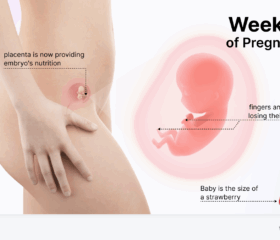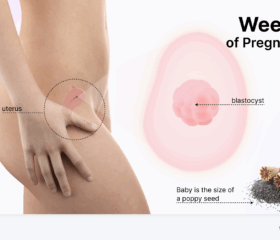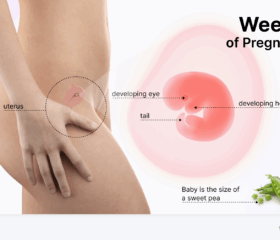Pregnancy Week by Week
27 Weeks Pregnant
Your baby is as big as a small head of cauliflower.
14.41
inches
1.93
pounds
- 27 Weeks Pregnant: End of the Second Trimester, Baby Growth, and Tips
- Your baby’s development at 27 weeks
- What's happening to your body at 27 weeks?
- What are common pregnancy symptoms in the 27th week?
- How to manage your symptoms and look after yourself at 27 weeks
- How to prepare for your third trimester
- Final thoughts
27 Weeks Pregnant: End of the Second Trimester, Baby Growth, and Tips
Your body and your baby are both changing rapidly, and you’ll probably kick off your third trimester with fairly prominent symptoms—some new, some old. Let’s dive into what you can expect at 27 weeks pregnant.
Your baby’s development at 27 weeks
At 27 weeks, your baby is approximately the size of a small cauliflower, measuring just under 14.5 inches long and weighing approximately 2 pounds. 1
Here’s what’s happening to her in detail:
- Skin: Your little one won’t look like a raisin for much longer! As she gains fat, her skin is smoothing out and looking less wrinkly. It’s also no longer transparent, although it’s covered in the vernix, a waxy coating that protects it. 2
- Brain activity: Your baby’s brain is continuing to grow, and her entire nervous system, including her brain, spinal cord, and nerves, is maturing. 3
- Hearing: Your baby can now recognize your voice. It’s a great time to start singing, reading, and talking to her. 4
- Eye movement: Your baby’s eyes can now open and close, and she may even move in response to light. Try shining a flashlight on your belly—you might feel a little wiggle or kick. 3
- Breathing: Your baby’s practicing inhaling and exhaling. There’s no air in the womb, but she can do this by swallowing your amniotic fluid, getting her ready for her first breaths outside the womb. Her lungs are also producing surfactant, a substance that will help her lungs expand after birth. 3
- Hiccups: Those rhythmic little movements you feel could very well be fetal hiccups. They’re totally normal and not distressing to your baby, so relax. Hopefully you can learn to enjoy the (somewhat strange) sensation instead of being put off by it. 5
- Taste buds: Your baby’s taste buds are now well-developed, and she can even taste your amniotic fluid, which may be affected by what you eat. If you like eating spicy food, she’ll notice it. 6
When is your baby most active?
You may find that your baby is more active after you eat, when your blood sugar levels increase. Many babies are more active at night, too, so try not to be frustrated if she keeps you up.
You’re almost certainly tracking your baby’s movement (it’s pretty hard to avoid that when she’s kicking around inside the womb), so if you notice that she’s less active than normal, contact your doctor.
If she’s quiet for 12–14 hours, that’s a warning sign. Your doctor may instruct you to start doing kick counts at 28 weeks for an hour or two every day.

What's happening to your body at 27 weeks?
As you enter your final week of the second trimester, your body is also going through big changes. Let’s look at some of them.
Your baby bump at 27 weeks
Remember two weeks ago, when your uterus was about the size of a soccer ball? Well, it’s now a basketball!
Your belly will grow accordingly. Your fundal height (the distance from the top of your uterus to your pelvic bone) corresponds with your week of pregnancy, and by now, it likely measures around 10.6 inches (27 cm). 78
Other significant body changes
You may also notice:
- Swelling and edema: Many women experience swollen feet during pregnancy, along with swelling in their ankles and hands. This is caused by your body retaining much more water than usual, which is normal during pregnancy. 9
- Extra body hair: You may have more hair growing on your face and body. Don’t panic—this is a temporary change. You can safely wax, tweeze, or shave this excess hair if it bothers you.
- Stretch marks: As your belly grows, your skin may feel dry and itchy. You may also notice stretch marks appearing. This is also totally normal and happens to about 80% of pregnant women. 10
- Extra weight: You’ve hopefully been gaining weight at a steady pace. Most doctors recommend gaining 25–35 pounds throughout your pregnancy. 11 In the second trimester, you can expect to gain about a pound per week, although weight gain guidelines vary depending on your pre-pregnancy body mass index (BMI).
What are common pregnancy symptoms in the 27th week?
Here are some of the most common pregnancy symptoms that women encounter at 27 weeks:
- Contractions: You might get irregular contractions at this stage. These are known as Braxton Hicks contractions, and many women mistake them for a sign that they’re going into premature labor. Fortunately, that’s not the case; you can think of these as “practice” contractions, and unlike labor contractions, they’re usually not painful.
- Urinary incontinence: Your expanding uterus will put pressure on your pelvic-floor muscles, which can cause you to leak urine. It’s more likely to happen when you cough or sneeze. 12
- Restless legs syndrome (RLS): You might experience a “creepy-crawly” sensation in your legs with an accompanying urge to move them, particularly at night. This (rather annoying) symptom is known as restless legs syndrome.
- Bleeding gums: When you’re pregnant, your gums are more vulnerable to plaque, which can cause them to get inflamed and bleed.
- Backaches: Those pesky hormones will loosen your ligaments and joints, which may give you backaches. You’re not alone—an estimated 50% to 80% of women experience backaches during pregnancy. 13
- Pelvic pain: For much the same reason, you may get sharp pains and throbbing aches in your hips and groin.
- Twitchy eyes: You may notice your eyes twitching. This is common during pregnancy and is often caused by vitamin or mineral deficiencies, although pregnancy-induced fatigue and stress can also play a role. It’s usually temporary, but if it becomes persistent or bothersome, talk to your doctor. 14
- Faintness and dizziness: You may feel dizzy or faint at this stage of your pregnancy. It’s usually nothing to worry about, but you should definitely let your doctor know about it.
When should you see a doctor?
Most of the symptoms mentioned above are normal, but keep a close eye on them. You could try using a pregnancy tracker app to monitor your symptoms (some of the best pregnancy trackers include tips on what’s normal), as certain ones can be a sign of complications, which we’ll detail below:
Preeclampsia
Preeclampsia is a condition that causes high blood pressure in pregnant women, almost always after week 20 or so. It’s a serious complication that can be life-threatening, so if you experience any of the following symptoms, contact your doctor straight away:
- Sudden or severe swelling in your face, hands, and feet
- Blurry vision (or any other big changes to your vision)
- Severe headaches 15
- Pain in the upper abdomen
Preterm labor
Going into labor earlier than week 37 of your pregnancy is defined as preterm labor. Important signs to watch out for are: 16
- Your water breaking
- Regular contractions (every 10 minutes, or more often)
- Change in your pregnancy discharge (leaking fluid or bleeding)
- Low, dull backache
Both preeclampsia and preterm labor are relatively rare, and the odds are good that your aches and pains aren’t indicative of anything beyond you being pregnant. However, when in doubt, it’s always better to hear that from a professional.
How to manage your symptoms and look after yourself at 27 weeks
If your symptoms are getting you down, here are ways to manage them and ensure you and your baby continue doing well:
Get some rest
Try to get as much sleep as you can, even though this can be difficult as your pregnancy progresses.
Avoid the wrong sleeping positions for pregnancy (i.e., lying flat on your back). Most doctors recommend sleeping on your side, especially in the third trimester. A good pregnancy pillow can help you stay comfortable when you’re trying to get some shut-eye.
Stay active
While it might seem counterintuitive, exercise can alleviate some of your uncomfortable pregnancy symptoms, such as constipation and RLS. Moreover, pregnancy-safe exercises can strengthen your muscles, improve your posture, and support better circulation.
If you haven’t tried Kegel exercises already, now’s a good time to start. They strengthen your pelvic floor muscles, which can prevent urine leaks, reduce hemorrhoids, and even improve your muscle tone down there (which at least some women swear benefits sex during pregnancy and after). 17
Stay hydrated
Make sure you’re well-hydrated during the day. Drinking enough water will help with symptoms like swelling and constipation. However, it’s OK to drink less water before bed to reduce trips to the bathroom in the middle of the night.
Take your supplements
While you’ll need to maintain a healthy pregnancy diet, you also need to include supplements alongside your meals. Your body needs extra nutrients when you’re pregnant, such as:
- Folate
- Iron
- Vitamin D
Be sure to include these supplements alongside your meals. 18 On that note, you should avoid supplements containing vitamin A, as too much could harm your baby.
Alongside these supplements, continue taking your prenatal vitamins for the remainder of your pregnancy. Talk to your doctor if you’re struggling with any of the side effects of prenatal vitamins, like nausea.
Track your weight gain
Keep an eye on your weight gain, as both excessive and insufficient weight gain can raise the risk of complications.
If you’re not totally sure if you’re gaining the right amount of weight, talk to your doctor. They can tell you whether or not you’re on track and may be able to give you dietary recommendations.
Don’t be afraid to lean on your loved ones
As you approach the end of your pregnancy, you might find yourself feeling more emotional. Don’t neglect your support system. You need someone to reach out to, whether that’s a partner, friend, your family, or a therapist.
How to prepare for your third trimester
While you probably found the second trimester easier than the first, the approaching third trimester is often considered the hardest. It’ll be more than worth it, of course—even though you’re entering a more challenging stage, you’re closer than ever before to meeting your little one.
Here are some things to bear in mind as you prepare for your third (and final) trimester:
Prepare for more prenatal visits
You’ll begin seeing your doctor or midwife more frequently:
- From weeks 28 to 36: You’ll usually see them every two weeks
- Until delivery: At this point, your visits will become weekly affairs
These visits will include regular checks of your blood pressure, weight, urine, and your baby’s heartbeat. Your doctor will also measure your fundal height to make sure your baby is growing as expected.
Go shopping
Now’s a good time to stock up on items that will make the end of your pregnancy and your early postpartum days more manageable. Look into nursing bras, comfy robes, and lounge pants.
You can also start thinking about your hospital bag. Pack anything specific you know you’ll want with you; it’s better to be prepared in the unlikely event that your baby decides to come a little early.
Think about your baby’s safety
It’s time to start thinking about taking safety measures for your baby. Research how to baby-proof your home, double-check that all your baby gear meets safety requirements, and consider signing up for infant CPR classes.
You should also consider getting an infant car seat. If and when you do, make sure it’s properly installed.
Make sure you’re up-to-date with your vaccinations
You and anyone who will be in close contact with your baby should be up-to-date with all of your vaccines (and on that note, yes, you can get the flu shot while pregnant).
It’s also recommended to get the Tdap shot during your pregnancy, ideally in the early part of the third trimester, to protect against tetanus, diphtheria, and pertussis.
Final thoughts
Well done on reaching the end of your second trimester. As nerve-wracking as it can be to draw closer and closer to the big day, remember that you’ll soon be cuddling your newborn baby.
Although the third trimester will present new challenges, you’ll get through it. Celebrate; you’ve done great so far!
Article Sources
- Baby Your Baby. "Fetal Growth Chart" Retrieved June 25, 2025.
- National Health Service. "Week 27" Retrieved June 25, 2025.
- Mount Sinai. "Fetal development" Retrieved June 25, 2025.
- MedlinePlus. "Fetal development" Retrieved June 25, 2025.
- The University of Texas Southwestern Medical Center. "Fetal hiccups won’t harm your baby – they’re totally normal!" Retrieved June 25, 2025.
- The Anatomical Record . "Embryonic and early fetal development of human taste buds: a transmission electron microscopical study" Retrieved June 25, 2025.
- Middlesex Health. "Fundal height: An accurate sign of fetal growth?" Retrieved June 25, 2025.
- OpenLearn Create. "What does measuring the height of the mother’s uterus tell us?" Retrieved June 25, 2025.
- National Health Service. "Swollen ankles, feet and fingers in pregnancy" Retrieved June 25, 2025.
- National Health Insurance. "Stretch marks in pregnancy" Retrieved June 25, 2025.
- U.S. Centers for Disease Control and Prevention. "Weight Gain During Pregnancy" Retrieved June 25, 2025.
- International Urogynecology Journal. "Stress urinary incontinence in pregnant women: a review of prevalence, pathophysiology, and treatment" Retrieved June 25, 2025.
- Cedars Sinai. "Back Pain During Pregnancy" Retrieved June 25, 2025.
- Cedars Sinai. "Eye Twitching" Retrieved June 25, 2025.
- National Health Service. "Pre-eclampsia" Retrieved June 25, 2025.
- Eunice Kennedy Shriver National Institute of Child Health and Human Development. "What are the symptoms of preterm labor?" Retrieved June 25, 2025.
- MedlinePlus. "Kegel exercises - self-care" Retrieved June 25, 2025.
- National Health Service. "Vitamins, supplements and nutrition in pregnancy" Retrieved June 25, 2025.







